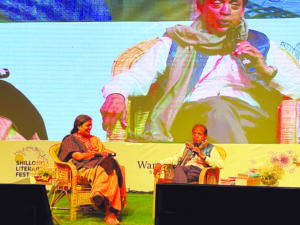By Abha Anindita

SHILLONG, Nov 18: The Shillong Literary Festival, now in its fourth edition, has built a reputation as a hub for creative voices, but this year, it managed to secure a particularly elusive gem — Vikram Seth. Known for his literary masterpieces A Suitable Boy and The Golden Gate, Seth is notoriously selective about public appearances. His participation in the festival was, as he put it, almost accidental.
“I’m quite nervous in front of crowds,” Seth admitted while speaking to The Shillong Times, following the inaugural session,” adding with a wry smile, “When I heard about Shillong, a place associated with friends of mine, the word ‘yes’ just slipped out.” “When I heard of a singing Chief Minister, and the cherry blossoms,” defining Shillong as ‘Kyoto of the West’, “it was hard to deny,” said Seth.
The audience, aware of his rare public engagements, hung on to every word as Seth shared his views on the intimate nature of reading and the role of literary festivals in promoting a reading culture.
During the inaugural session, Seth had teasingly mentioned that reading should be a more personal habit, and should not be a ‘tamasha’; but he successfully evaded it later during the conversation remarking: “To each their own.”
Recalling a personal anecdote, Seth said, “Once, a friend refused to go for a walk with me because he was engrossed in a book. When I looked closer, I realised it was my book!” The moment, he said, was a reminder of how private the act of reading truly is.
On literary festivals, Seth offering a nuanced perspective, said, “When done right, these festivals create space for meaningful engagement with literature. The question is whether they inspire something in the human heart,” he remarked. Seth’s emphasis on thoughtful dialogue over spectacle was a subtle critique of trends where festivals often prioritise entertainment over substance.
Seth also addressed the challenges and opportunities of adapting literature for the screen. “Something is always lost in translation, but something else can be gained,” he said, citing his novel An Equal Music. “A film adaptation, for instance, could bring its music to life in a way the novel cannot.”
Later when he took the stage, on the first day of the Litfest, he concluded the session with a reading of Fire — a poem from his book The Rivered Earth. Playfully pronouncing it as “Fiyaaah,” Seth captivated the audience with the poem’s vivid imagery and emotional depth.
The Rivered Earth is a collection of poems written as libretti for musical compositions, blending influences from Indian, Chinese, and European traditions. With Fire, Seth explored the complexities of elemental forces, reflecting his broader themes of interconnectedness.
While Seth’s presence was the festival’s highlight, another literary luminary, Shobha De, brought her incisive commentary on feminism, misogyny, and the evolving space for women in Indian writing.
De, a columnist, journalist, and novelist with a career spanning five decades, reflected on the label of feminism. “Feminism in India isn’t about confrontational politics; it’s about living harmoniously and ensuring equality for all, women, men, and children included,” she said, speaking to The Shillong Times.
Touching on the rise of misogyny, especially in the digital age, De observed, “Social media has amplified this phenomenon, but it’s also given women a platform to push back. Urban Indian women today are far less reliant on male validation compared to their Western counterparts.”
“Feminism for me has always been a loaded term,” De explained, adding that she doesn’t fully subscribe to its Western political overtones. “In India, our cultural ethos and understanding of being a woman differ significantly. Feminism here isn’t about confrontational politics; it’s about living harmoniously and ensuring equality, not just for women but for all, men and children included.”
De also reflecting on the rise of misogyny as a cultural phenomenon, particularly in the age of social media, said, “The word misogyny re-entered popular consciousness after Donald Trump’s victory, with his provocative and often insulting statements about women. For me, misogyny represents a deep-seated suspicion or dislike of women, often manifesting in attempts to impede their progress.”
“However, I believe Indian women, especially in urban areas, are far less reliant on male validation compared to their Western counterparts,” she added.
On the evolution of women’s voices in Indian literature, De recalled the skepticism she faced when her first book was published in the 1980s. “At the time, publishers believed there was no market for women’s voices. That was a challenge I couldn’t ignore. The commercial success of my debut novel opened doors not just for me but for many women writers who followed.” Today, she celebrates the explosion of opportunities for young women in writing, from digital platforms to self-publishing, seeing it as a sign of progress and empowerment.
Further, De, in her session with Jerry Pinto, which ended the first day of the Shillong Litfest, talked about how movies have evolved over the years, and so has Bollywood.



